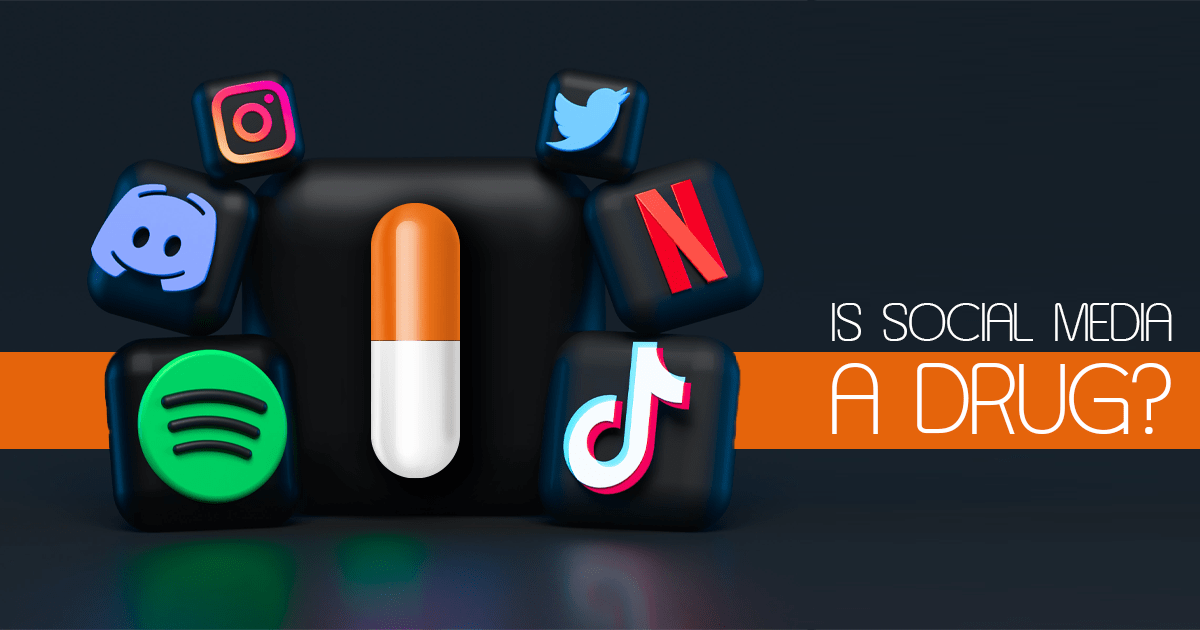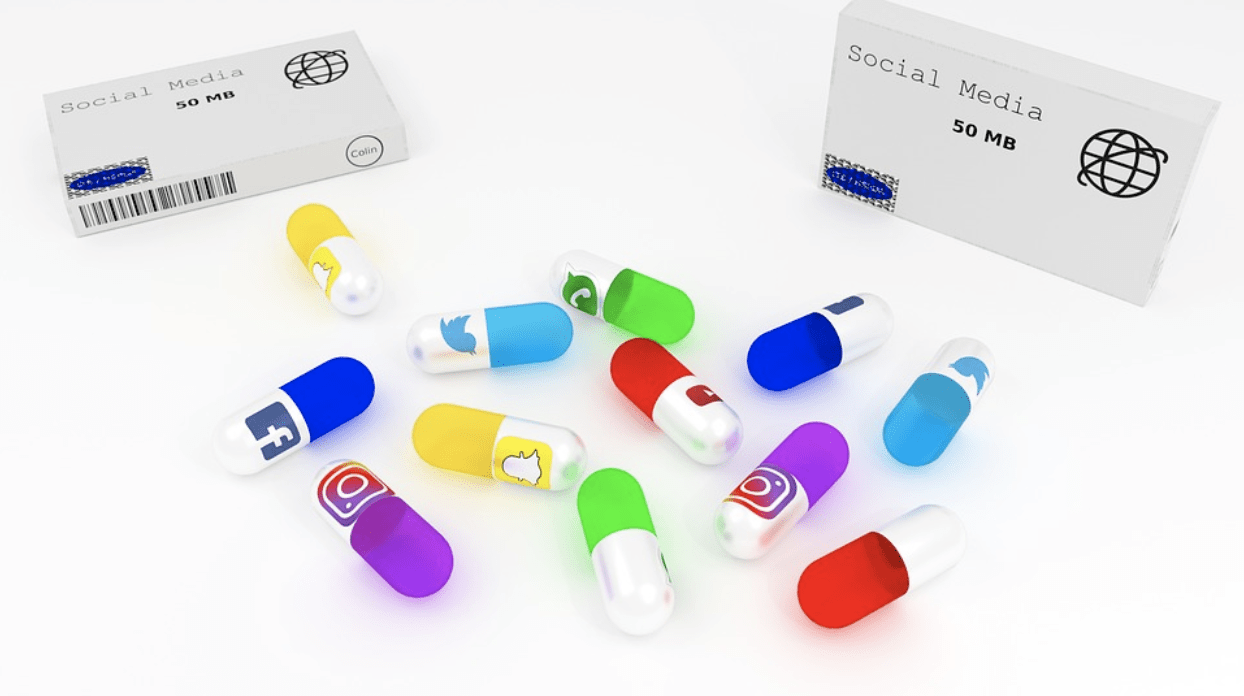
The question “is social media a drug” is one we increasingly hear. We’re learning more about the effects of sites like Instagram and Facebook on our brains and mental health. These effects are often similar to how addictive drugs affect the brain. While social media isn’t a drug, there are similarities.
The effects of addiction to social media can compare to using a drug like cocaine as far as dopamine and how they affect your brain’s reward circuit.
There’s some debate about whether or not social website addiction should be a diagnosable behavioral addiction because of these similarities.
Currently, there isn’t an official diagnosis for addiction to social apps, but that doesn’t mean there won’t be eventually. Researchers have already drawn parallels between social media usage and individuals with substance use disorders.
How Could Social Media Become An Addiction?
Social apps and websites are a way to connect with family and loved ones and perhaps find entertainment. As with other behavioral addictions, that can turn into something harmful. You might excessively, compulsively use social networking to the detriment of other parts of your life.
Some experts say as much as 10% of people in the U.S. could meet a social network addiction criteria.
Others say that number could be much higher.
- For social media users, it increases dopamine signaling in the brain.
- Dopamine is a neurotransmitter that associates with pleasure.
- You get a rush of dopamine after using these apps and sites, just like you would with an addictive drug like cocaine.
- Your brain identifies whatever triggered the dopamine as rewarding and something you should repeat.
- You may feel even more of this dopamine spike if you get positive feedback.
- For example, if you post a picture and get a lot of likes, it can trigger even more dopamine than just using social apps or sites alone.
- The positive feelings stemming from engaging with these apps and sites aren’t going to last forever.
- The brain’s engagement with positive reinforcement often occurs in other addictions.
Once those feelings from the dopamine go away, you’ll go back to whatever triggered them for more. In this case, it’s the platform you’re going back to.
Researchers at Harvard University found that the same parts of the brain light up when using social apps when taking an addictive substance.
Research teams find that when you get a notification, such as a mention or a like on a social platform, your brain gets a rush of dopamine. That dopamine then travels along reward pathways. You’re getting an immediate reward for little effort. Your brain eventually rewires itself because of this positive reinforcement. You’ll want to get more and more attention on social networking as your brain changes in response to exposure.
Our brain’s reward centers are also most active when talking about ourselves. We’re estimated to speak about ourselves 30-40% of the time in the real world. However, you may be talking or sharing about yourself 80% of the time on social platforms. You’re posting pictures of yourself, for example, that are then getting positive feedback.
When Does Social Media Become a Problem?
One of the first red flags you might identify that could show the effects of addiction to social media is when it’s a coping mechanism. If you or someone you love regularly turns to social media to deal with uncomfortable feelings like loneliness, depressive symptoms, or stress, this might indicate a problem.
Social media platforms can provide a continual stream of rewards you aren’t otherwise receiving in daily life, so you want to engage more.
That desire to engage increasingly with these sites can lead to problems in authentic relationships and declines in school or work performance. Some people find excessive use affects their mental and even their physical health.
The more people turn to apps to relieve hard feelings or as a coping mechanism, the more their dependence on them will grow.

Symptoms of a Social Media Addiction
Identifying behavioral addictions can be a little more complex than substance addictions in some cases. Some of the signs of a potential social media usage addiction can include:
- Someone spends a lot of time thinking about social media platforms or planning to use them
- Increasing urges to use these platforms more and more despite negative consequences.
- Social media overuse to forget problems or deal with symptoms of mental disorders
- Unsuccessful attempts to cut down on use, much like drug addicts experience.
- Restlessness or irritability can occur if the person can’t use social media apps for any reason, which can be similar to withdrawal symptoms seen with substance use disorders.
- Use is so excessive it’s creating negative outcomes at school or work. For example, academic performance may decline.
Someone who can answer yes to three or more of the above questions could have a problematic relationship with social media and potentially addiction.
The Effects of Social Networking on Mental Health
Even if someone doesn’t necessarily meet the criteria for addiction-related to social sites, there are relationships between use and poor mental health or low self-esteem. When you use these sites too often, you’re more at risk of feeling lonely and isolated.
- You may find that you’re constantly comparing yourself to other people who have carefully curated their content to cultivate a specific image.
- You could feel depressed or jealous if you think your life isn’t as “good” as people’s lives on these sites.
- Studies show that when you use social networking sites, you may believe other users are happier and more successful than in reality.
- You may find you’re constantly comparing yourself to unrealistic images people create of their lives.
- These effects raise the risk of negative self-image and the development of depression and anxiety.
Effects On Young People
Younger people tend to use these platforms more often and be more significantly affected by them in often negative ways. You can get help at an intensive outpatient facility.
- Around 27% of children who spend three or more hours per day on networking sites show symptoms of poor mental health.
- The brains of young people are still developing, as are social skills.
- With habitual social networking engagement, young people’s social interaction skills may not develop the way they should.
- Studies show among young people who heavily engage with these platforms; there are higher rates of negative body image and depression and lower empathy and compassion.
- Social networking images that are filtered and appear perfect can contribute to disordered eating in young people.
- There’s also the risk of online bullying on these platforms. In the past, young people could escape from bullying at home. Now, they’re constantly bombarded with these negative behaviors.
Final Thoughts—Is Social Media a Drug?
While apps and websites aren’t drugs, many effects are very similar to highly addictive substances. If you’re the parent of a young person who’s struggling with social network sites or perhaps related mental health issues, please contact Anchored Tides Recovery by calling 866-600-7709. We can help you learn more about treatment programs that may be available.



























